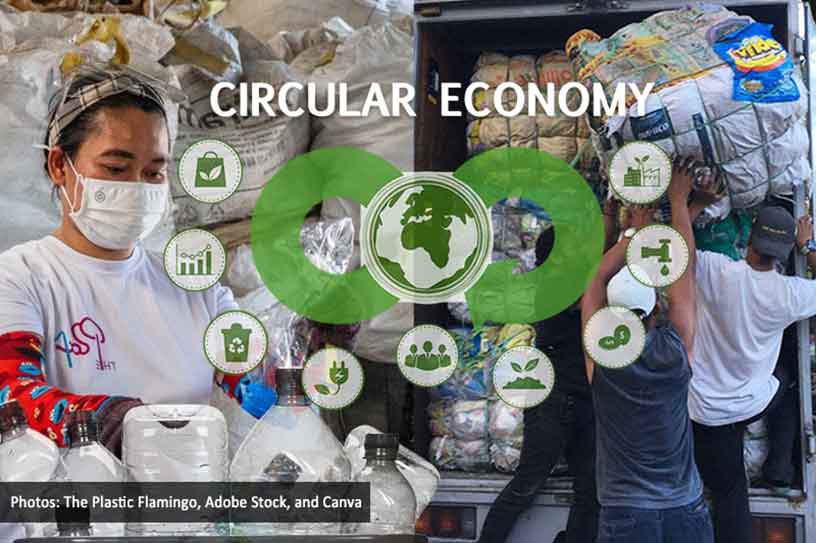
A new study by the Philippine Institute for Development Studies (PIDS) emphasizes the critical need to adopt circular economy (CE) principles in addressing material and solid waste management challenges in the country. Titled “Study on Circular Economy Pathways for Waste Management in the Philippines”, the work underscores the need for more innovative and sustainable resource utilization and waste management solutions.
Authored by PIDS Consultant Gregorio Rafael Bueta, Senior Research Fellow Sonny Domingo, and former Research Specialist Arvie Joy Manejar, the study claims that CE has been gaining attention and traction in recent years, particularly as a conceptual framework and approach to solving the global waste crisis. Laws and initiatives to advance CE are increasingly being adopted nationally and regionally.
“The CE concept optimizes resource use and minimizes waste through promoting recycling, reusing, and repurposing,” the authors explained. “Embracing the principles of the CE will create opportunities for solutions and innovations in waste management, drive innovation, and support the transition towards a more sustainable system,” they added.
The Philippines faces significant waste management issues, including limited infrastructure and inefficient resource utilization. The study reports that there are only 237 sanitary landfills servicing 1,634 cities and municipalities, and 11,625 materials recovery facilities covering over 42,000 barangays.
A recent report by the World Bank further showed that the Philippines is a net exporter of plastic scrap with a recycling gap of 85 percent, losing most of the value of recyclable resins. The country also ranks as the third largest contributor of plastic waste to the world’s oceans, with an estimated yearly volume of 0.75 million metric tons. This poor performance indicates significant avenues to close the circularity gap.
To address the above challenges, the authors call for the integration of CE principles into national, subnational, and sectoral policies. “The government needs strong regulations for resource use, while businesses should innovate for sustainability. NGOs need to empower communities with local circular initiatives, and citizen participation is key for long-term success,” said the authors. Various stakeholders can contribute to the development and implementation of policies and programs to ensure that diverse perspectives and expertise are considered.
Despite the absence of a specific CE law in the Philippines, the authors claim that existing legal frameworks on waste management directly and/or indirectly relate to CE concepts and approaches. Recent policy and institutional developments also present opportunities for better stakeholder cooperation and collaboration, and the application of technological solutions and innovations.
The passage of the Extended Producer Responsibility (EPR) Act of 2022 is a positive step towards institutionalizing CE in the Philippines. However, the authors note that successful implementation requires tailoring these principles to the local context. “CE initiatives must build on the gains from the implementation of the Ecological Solid Waste Management Act (RA 9003), while addressing existing institutional gaps and chronic weaknesses in cascading policy down to local levels,” they suggested.
Stakeholders must be incentivized to invest on material design, recycling, and other CE-related investments. The upfront costs for implementing CE strategies may be higher in terms of required human capital, equipment, and facilities, but these are crucial for long-term sustainability.
The authors acknowledge that the government needs to focus on bridging critical institutional and implementation gaps including the creation and/or operationalization of the National Ecology Center and local solid waste management or environment offices, provision of technology, facilities and waste management resources, and facilitation of public-private partnerships for capital and infrastructure needs. Ultimately, clear policy direction and cascading, and efficient program execution are key in enabling the successful application of CE models in the Philippines.
Read full study here: https://pids.gov.ph/publication/discussion-papers/study-on-circular-economy-pathways-for-waste-management-in-the-philippines. ###




















